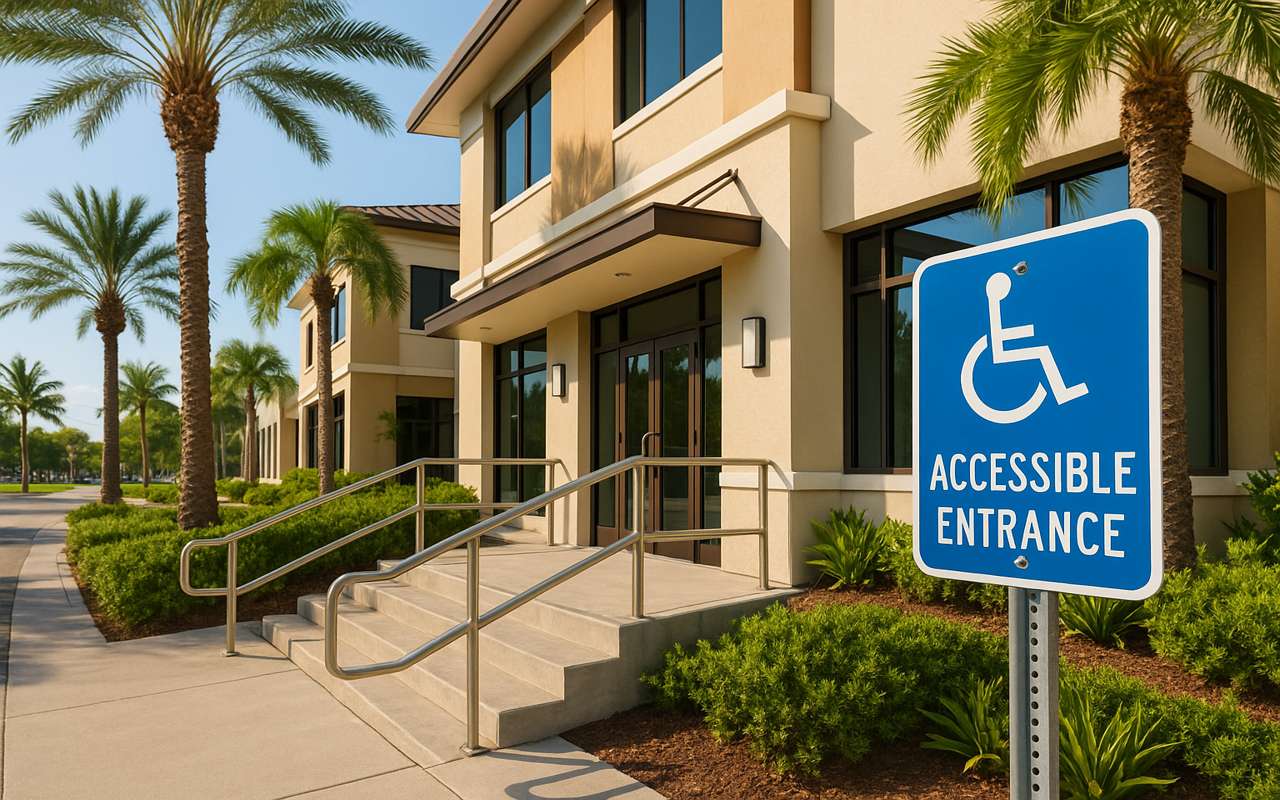
Miami’s diverse business landscape means your building serves a wide range of people, including individuals with disabilities. Ensuring your commercial property meets accessibility requirements is not only the law but also a smart business decision. The Americans with Disabilities Act (ADA) sets clear standards for accessible design in public accommodations and commercial spaces. In Miami, with its strong hospitality, retail, and professional service sectors, failing to comply can limit your pool of tenants, attract lawsuits, and impact your reputation as a property owner.
Miami building accessibility is more than just a checklist. It is about ensuring everyone can enter, navigate, and use your property. With Florida’s aging population and tourism-driven economy, providing accessible spaces can also make your property stand out in a competitive market.
What Does the ADA Require in Miami?
The ADA requires most commercial buildings, including offices, restaurants, stores, and service providers, to be accessible to people with physical disabilities. For new construction, the law is strict: entrances, bathrooms, parking, and common areas must meet federal standards. For existing buildings, the law requires “reasonable modifications” to remove barriers unless doing so would be too costly or structurally impractical.
Miami building accessibility includes:
- Accessible Entrances: Ramps, wide doors, and accessible hardware are all essential so everyone can enter without difficulty. These features make a building inviting and usable for individuals with mobility challenges and help ensure your building meets basic legal requirements.
- Parking: Designated accessible parking spaces with proper signage and space for vans or wheelchair lifts are a must. Accessible parking ensures visitors and employees with disabilities have safe and convenient access to your property, which is especially important in Miami’s busy business districts.
- Restrooms: Features such as accessible stalls, grab bars, and clear floor space are needed. Upgrading restrooms is often required during tenant build-outs or renovations, and compliance reduces the risk of complaints or legal action.
- Pathways and Corridors: All main routes must be wide, unobstructed, and free of steps or sudden level changes that create hazards. Keeping hallways clear benefits everyone, not just people with disabilities, and it can help with emergency evacuations. Elevators or Lifts: These are required for multi-story buildings unless an exception applies. If your Miami property is more than one story, you will likely need a compliant elevator or lift unless you can demonstrate undue hardship or a specific exemption.
Local Miami-Dade County codes may add requirements that go beyond federal standards. Always check local rules before starting any construction or renovation.
Who Is Responsible: Landlord or Tenant?
Many Miami landlords and tenants are unsure who must pay for accessibility upgrades. The answer often lies in the lease. Generally, the property owner is responsible for the building’s structure, entrances, parking, and shared spaces. Tenants are typically responsible for accessibility within their own premises. Still, most leases require tenants to follow all laws, including ADA standards.
If your building is not fully compliant, tenants may request upgrades or negotiate for changes before signing. Some tenants may be required by their own business type, for example, medical or retail, to make specific improvements. Discuss ADA responsibilities up front and clarify who pays for what in the lease. It is smart to consult a real estate attorney to review lease language and prevent future disputes.
Steps to Assess and Improve Accessibility
- Conduct an Accessibility Audit: Bring in a qualified consultant or architect with Miami building accessibility experience. An accessibility audit provides a comprehensive review of your property, identifying any non-compliance issues and helping you understand the improvements needed. This step is a proactive way to prevent problems before they become legal liabilities.
- Review Local Building Codes: Miami-Dade may have stricter rules than federal law. Double-check requirements with local building departments or your attorney to ensure your property is up to date with all necessary standards. Staying current with local regulations helps you avoid fines and delays in your improvement projects.
- Create a Plan and Budget: Once you have your audit results, develop a prioritized plan for upgrades and repairs. It may not be feasible to fix everything at once, but you can schedule improvements over time, starting with the most critical areas like entrances, restrooms, and parking.
- Communicate with Tenants: Let your tenants know about planned accessibility improvements, project timelines, and how any work may affect their operations. Clear communication can build goodwill, reduce confusion, and make it easier to coordinate schedules if construction impacts common areas.
- Document Everything: Keep thorough records of upgrades, correspondence with tenants, and compliance efforts. If a dispute or legal claim ever arises, this documentation will help show that you have acted in good faith to improve accessibility and follow the law.
The Legal and Financial Risks of Non-Compliance
Failure to address Miami building accessibility puts you at risk of legal claims. Florida has a high volume of ADA lawsuits, and plaintiffs do not need to prove actual damages, only that barriers exist. Penalties can include required upgrades, monetary damages, and attorneys’ fees. Lawsuits are public record and can affect your standing with lenders and insurers.
Making your building ADA-compliant is often less expensive than defending a lawsuit. Some owners find that accessibility improvements qualify for federal tax credits or local incentives, which can help offset costs. Regularly reviewing your property and updating as codes change helps protect your investment
How Kleiner Law Group Can Help
Navigating ADA compliance and Miami building accessibility can be complex. Kleiner Law Group reviews leases, clarifies landlord and tenant responsibilities, and advises on practical solutions to meet federal and local requirements. We do not handle litigation or disputes, but we guide commercial property owners through compliance steps and draft clear lease provisions. If you are planning upgrades, negotiating with tenants, or want to ensure your building meets accessibility standards, contact Kleiner Law Group for tailored support.